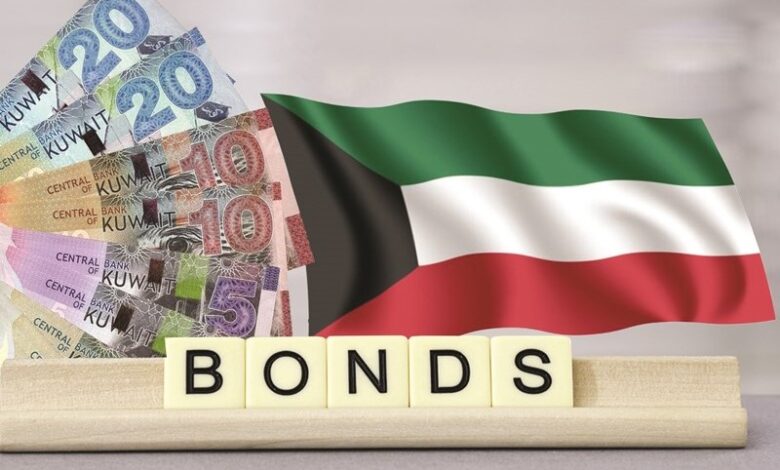Kuwait to pay 160 million dinars in local bond payments in May, August
The first maturity of local bonds was on May 1, with a value of ten million dinars. These are traditional bonds that were offered on May 1, 2014, for a period of ten years with a fixed interest rate of 3.125%

-
The third maturity, valued at 100 million dinars, will be paid by August 21, 2024. This amount is distributed among 40 million dinars in Islamic bonds and 60 million dinars in conventional bonds
-
Bonds worth 50 million dinars were issued on June 21, 2017, for a period of ten years and are divided into 20 million Islamic bonds and 30 million conventional bonds, with a variable interest rate of 3%.
-
Regarding global bonds, Kuwait has dues worth 1.370 billion dinars that will be paid on March 20, 2027, with an interest rate of 3.5%
According to credible sources speaking to Al-Anbaa newspaper, Kuwait is set to fulfill local bond payments totaling 160 million dinars in May and August 2024.
These bonds were originally issued by the Ministry of Finance between 2014 and 2017 to address the financial shortfall in the state’s general budget.
In detail, the sources said that the first maturity of local bonds was on May 1, with a value of ten million dinars. These are traditional bonds that were offered on May 1, 2014, for a period of ten years with a fixed interest rate of 3.125%.
Additionally, bonds worth 50 million dinars were paid on the first of May, distributed among Islamic bonds worth 20 million dinars and conventional bonds worth 30 million dinars. The Ministry of Finance had offered these bonds for a period of seven years on May 10, 2017, with a variable interest rate of 2.5%.
The sources stated that the third maturity, valued at 100 million dinars, will be paid by August 21, 2024. This amount is distributed among 40 million dinars in Islamic bonds and 60 million dinars in conventional bonds. These bonds were issued on August 30, 2017, for a period of seven years with a variable interest rate of 2.750%.
Furthermore, by 2027, bonds worth 50 million dinars will be repaid. These bonds were issued on June 21, 2017, for a period of ten years and are divided into 20 million Islamic bonds and 30 million conventional bonds, with a variable interest rate of 3%.
In total, the value of local bonds due for repayment in 2024 and 2027 is about 210 million dinars, distributed among 80 million dinars in Islamic bonds and 130 million dinars in conventional bonds.
Regarding global bonds, Kuwait has dues worth 1.370 billion dinars that will be paid on March 20, 2027. Kuwait issued global bonds on March 20, 2017, for a period of ten years with a fixed interest rate of 3.5%. Thus, the total local and global debt owed by Kuwait that must be repaid is about 1.580 billion dinars.
The total local and global debt owed by Kuwait amounts to about 3.040 billion dinars, distributed among 2.440 billion dinars globally and 600 million locally.
This is represented by two global issuances worth 1.070 billion dinars that were paid in March 2022, and another global issuance worth 1.370 billion dinars that will be paid in 2027.
Regarding the local issues totaling 600 million dinars, there were ten local issuances, seven of which were repaid in 2022 and 2023, while the remaining three will be repaid in 2024, with one more in 2027. The repayment of these bonds will be financed from the General Reserve Fund, provided that the necessary liquidity for repayment is available.
Since 2014, Kuwait has resorted to external borrowing to address the financial deficit in the state’s general budget, coinciding with significant declines in oil prices. Borrowing was conducted for the benefit of the General Reserve Fund, which financed all items in the state’s general budget based on the actual needs of government agencies, including operating and consumer expenses.
The issuance of Kuwaiti bonds at that time was considered the best in the Gulf, as attested by international banks and financial institutions. This was due to the high level of interest from investors and the low cost of borrowing. Kuwait did not provide any guarantees to bondholders; instead, investors relied on Kuwait’s credit rating and the size of its sovereign fund when purchasing bonds.
Additionally, investors were convinced of the government’s economic and financial reform plan aimed at addressing structural imbalances in the Kuwaiti economy and countering the significant decline in the budget revenues caused by an over 80% drop in crude oil prices at that time.
The sources explained that, “In line with the current policy of the Investment Authority, the necessary cash liquidity to cover these obligations will be deposited in its local and external bank accounts on the specified date without delay.” They emphasized that “providing this liquidity will not involve withdrawals from any affiliated strategic investments, but rather through returns on investments made by the authority, including interest on bank deposits, bonds, sukuks, foreign real estate, and others.”
Source: Al Anba












